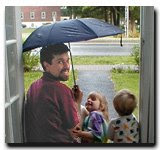Using solar energy for space heating is five times more affordable and four times more efficient than using solar energy to generate electricity.
More Facts About Solar Space Heating
- Solar space heaters (solar air thermal systems) collect heat from the sun and pump it inside on sunny days, while preventing heat from escaping at night or during cloudy days.
- Because they consume no fossil fuel during use and rely on solar energy that shines directly on the building where they are installed, solar space heaters have the lowest total environmental impact of any heating system available today.
- Solar space heaters have been successfully used in Maine since the 1970s. During that decade's energy crisis, several magazines published “do-it-yourself” plans for building solar space heaters from spare lumber and plate glass.
- Unlike the “do-it-yourself” wooden boxes from the '70s, modern solar space heaters feature aluminum frames, optimized glazing and absorber plates, back-draft dampers, and thermostat controls. Their expected useful lifetimes is 30 years.
- At Maine's latitude, solar space heaters are typically installed vertically on southern-facing walls. This maximizes winter solar gain and eliminates snow accumulation concerns.
- Solar space heaters cost about $1,700 per installed kilowatt, compared to $9,000 per installed kilowatt for solar electric (photovoltaic) systems.
- Total installed cost for a 1.5 kW SolarSheat space heater from F.W. Horch is $2,500, or you can buy the unit for $1,979 and install it yourself.
- Solar space heaters require no electric or plumbing connections, so they can be easily installed by carpenters or homeowners. They work just as well on a house in the suburbs as on a remote camp in the wilderness.
- In new construction, solar space heaters can be built into southern-facing walls, taking the place of siding.
- On existing buildings, solar space heaters are mounted on top of the existing siding or on the roof.
- Solar space heaters can also be ground mounted with heating ducts installed underground.
- The SolarSheat space heater has an SRCC efficiency rating of 625 watts per square meter, more than four times higher than a typical solar PV (electric) panel, which has an efficiency of less than 150 watts per square meter. (Solar efficiency ratings are based on insolation of 1,000 watts per square meter.)
- The reason solar space heaters are able to achieve four times greater efficiency than PV panels is that solar space heaters absorb a wider spectrum of solar energy and transfer the sun's heat energy rather than convert it to an electric current.
- During summer months when no space heat is needed, a solar space heater can simply be covered to shade it from the sun, or it can be controlled by a thermostat to prevent it from transferring heat inside.
- Combination solar space heaters and solar water heaters are available. These units operate as space heaters during the heating season and as water heaters during the rest of the year.
- Maine's solar rebate program covered solar space heaters. It is unclear whether state funding for this program will continue, or whether federal funding will become available. According to Efficiency Maine, “Rebates for solar photovoltaic (PV) and solar thermal installations are no longer available, as of January 16, 2009. Due to high demand and resource limitations, all of the funds made available for these programs have been allocated for this year. Under current law, the programs are due to receive renewed funding in January of 2010.”
- Solar space heaters can be used to reduce the heat load of any building with a sunny wall or roof, but they are best used in combination with electric heat or with high efficiency direct-vent combustion heaters that allow for air-tight and super-insulated construction.
- Climate data and heat loss models show that super-insulated buildings with heat storage and heat recovery ventilation systems can be heated entirely by solar space heaters to maintain a comfortable 68 degree Fahrenheit temperate year round in Maine.
- While reducing heating bills by 100% is theoretically possible with solar space heaters, heat load reductions of 25% to 50% are more reasonable targets for existing homes that are well insulated and weatherized. The remaining 50% to 75% of the heat load could be met with a wood stove or electric space heaters.

